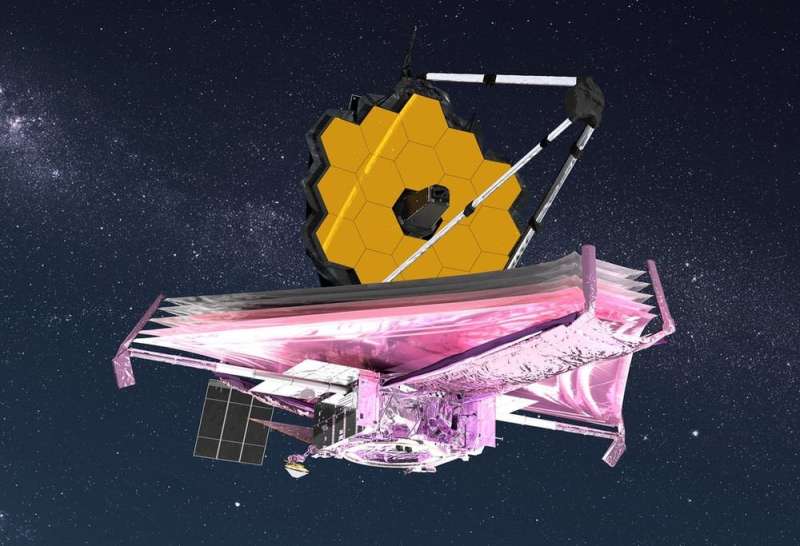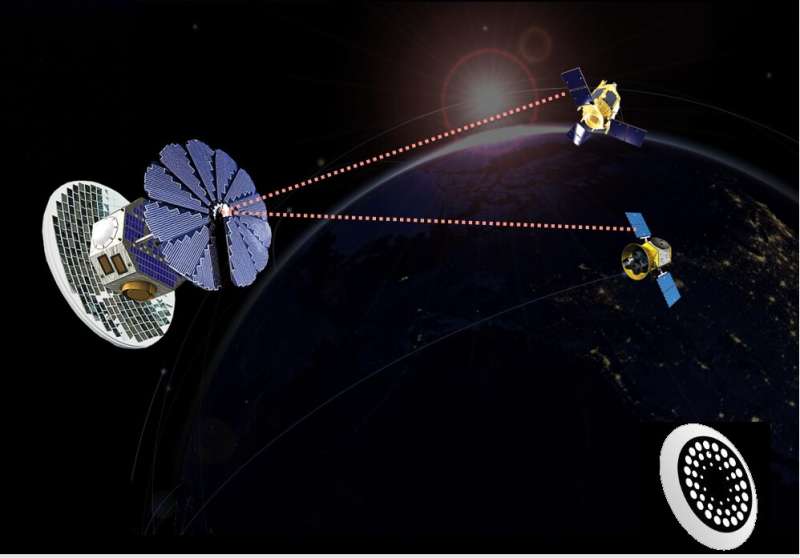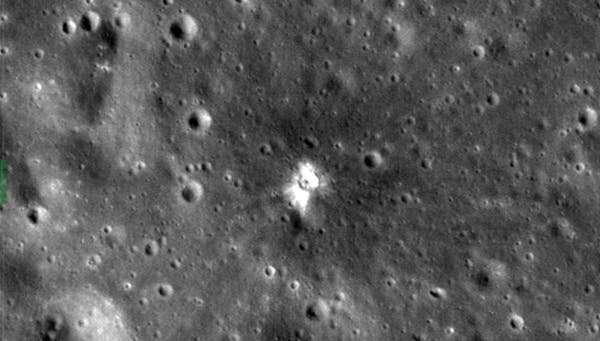
Copernical Team
Image: Crater 'tree rings' on Mars

This feature could easily be mistaken for a tree stump with characteristic concentric rings. It's actually an impressive birds-eye view into an ice-rich impact crater on Mars. Tree rings provide snapshots of Earth's past climate and, although formed in a very different way, the patterns inside this crater reveal details of the Red Planet's history, too.
The image was taken by the CaSSIS camera onboard the ESA/Roscosmos ExoMars Trace Gas Orbiter (TGO) on 13 June 2021 in the vast northern plains of Acidalia Planitia, centered at 51.9°N/326.7°E.
The interior of the crater is filled with deposits that are probably water-ice rich. It is thought that these deposits were laid down during an earlier time in Mars' history when the inclination of the planet's spin axis allowed water-ice deposits to form at lower latitudes than it does today. Just like on Earth, Mars' tilt gives rises to seasons, but unlike Earth its tilt has changed dramatically over long periods of time.
One of the notable features in the crater deposits is the presence of quasi-circular and polygonal patterns of fractures.
A lunar return, a Jupiter moon, the most powerful rocket ever built and the Webb Telescope

Space travel is all about momentum.
Rockets turn their fuel into momentum that carries people, satellites and science itself forward into space. 2021 was a year full of records for space programs around the world, and that momentum is carrying forward into 2022.
Last year, the commercial space race truly took off. Richard Branson and Amazon founder Jeff Bezos both rode on suborbital launches—and brought friends, including actor William Shatner. SpaceX sent eight astronauts and 1 ton of supplies to the International Space Station for NASA.
Revolutionizing satellite power using laser beaming

The University of Surrey and Space Power are tackling the problem of powering satellites in Low Earth Orbit (LEO) during their eclipse period when they cannot see the sun. By collaborating on a space infrastructure project, the joint team will develop new technology which uses lasers to beam solar power from satellites under solar illumination to small satellites orbiting closer to Earth during eclipse. The wireless, laser-based power beaming prototype will be the first developed outside of governmental organizations and is aiming for commercialisation by 2025.
Wireless power beaming is a critical and disruptive technology for space infrastructure and will provide auxiliary power to increase the baseline efficiency of small satellites in LEO. The technical side of the project will use the highly specialized laser laboratories and optical systems developed at the University of Surrey's Department of Physics and Advanced Technology Institute, which are world leaders in the development and implementation of laser and photovoltaic-based technologies.
Crashing rocket will create new moon crater: What we should worry about

It's not often that the sudden appearance of a new impact crater on the moon can be predicted, but it's going to happen on March 4, when a derelict SpaceX Falcon 9 rocket will crash into it.
The rocket launched in 2015, carrying NASA's Deep Space Climate Observatory (DSCOVR) probe into a position 1.5 million kilometers from the Earth, facing the Sun. But the expended upper stage of the rocket had insufficient speed to escape into an independent orbit around the Sun, and was abandoned without an option to steer back into the Earth's atmosphere. That would be normal practice, allowing stages to burn up on re-entry, thus reducing the clutter in near-Earth space caused by dangerous junk.
Week in images: 24 - 28 January 2022

Week in images: 24 - 28 January 2022
Discover our week through the lens
Island in a lake of lava - the Martian volcano Jovis Tholus
 These images, created using data acquired by the High Resolution Stereo Camera (HRSC) on board ESA's Mars Express orbiter, show the Jovis Tholus volcano and various other landscape features, such as tectonic faults, impact craters and solidified lava flows, in the Tharsis region of Mars. The Tharsis uplift, which is several kilometres high, was one of the most active volcanic regions near the Ma
These images, created using data acquired by the High Resolution Stereo Camera (HRSC) on board ESA's Mars Express orbiter, show the Jovis Tholus volcano and various other landscape features, such as tectonic faults, impact craters and solidified lava flows, in the Tharsis region of Mars. The Tharsis uplift, which is several kilometres high, was one of the most active volcanic regions near the Ma Tiny but very large wavelength perturbations solve Hubble Tension
 It is generally believed that the Universe is isotropic and homogeneous on large distance scales, i.e., there is no preferred position or direction in the Universe. This hypothesis forms the basis of the standard Big Bang cosmology and is called the cosmological principle (CP). It implies that the Universe is expanding and, to a good approximation, has exactly the same properties at all spatial
It is generally believed that the Universe is isotropic and homogeneous on large distance scales, i.e., there is no preferred position or direction in the Universe. This hypothesis forms the basis of the standard Big Bang cosmology and is called the cosmological principle (CP). It implies that the Universe is expanding and, to a good approximation, has exactly the same properties at all spatial Instant turn-over of magnetism by gyro motion of relativistic electrons
 Magnetic fields are detected throughout the universe and widely participate in astrophysical dynamics. Various fundamental phenomena, including coronal mass ejections, solar flares, gamma-ray bursts and pulsar winds, are dominated by variations in magnetic fields.
Although the mechanisms involved in the origin of magnetic fields in space are still uncertain, one of the widely accepted plau
Magnetic fields are detected throughout the universe and widely participate in astrophysical dynamics. Various fundamental phenomena, including coronal mass ejections, solar flares, gamma-ray bursts and pulsar winds, are dominated by variations in magnetic fields.
Although the mechanisms involved in the origin of magnetic fields in space are still uncertain, one of the widely accepted plau Mysterious object unlike anything astronomers have seen before
 A team mapping radio waves in the Universe has discovered something unusual that releases a giant burst of energy three times an hour, and it's unlike anything astronomers have seen before.
The team who discovered it think it could be a neutron star or a white dwarf-collapsed cores of stars-with an ultra-powerful magnetic field.
Spinning around in space, the strange object sends out
A team mapping radio waves in the Universe has discovered something unusual that releases a giant burst of energy three times an hour, and it's unlike anything astronomers have seen before.
The team who discovered it think it could be a neutron star or a white dwarf-collapsed cores of stars-with an ultra-powerful magnetic field.
Spinning around in space, the strange object sends out NASA's MRO Finds Water Flowed on Mars Longer Than Previously Thought
 Mars once rippled with rivers and ponds billions of years ago, providing a potential habitat for microbial life. As the planet's atmosphere thinned over time, that water evaporated, leaving the frozen desert world that NASA's Mars Reconnaissance Orbiter (MRO) studies today.
It's commonly believed that Mars' water evaporated about 3 billion years ago. But two scientists studying data that M
Mars once rippled with rivers and ponds billions of years ago, providing a potential habitat for microbial life. As the planet's atmosphere thinned over time, that water evaporated, leaving the frozen desert world that NASA's Mars Reconnaissance Orbiter (MRO) studies today.
It's commonly believed that Mars' water evaporated about 3 billion years ago. But two scientists studying data that M 